
At the beginning of the month, two Ossett army deserters were tried at the West Riding Quarter Sessions in Leeds. They were the brothers Joseph Edward Senior and Peter Senior who had committed a series of robberies in and around Ossett while they were on the run. Joseph was sentenced to six months hard labour and Peter to three months hard labour.
While the Seniors were starting their sentences, another Ossett man, 18 years old Victor Turner, left for military service. Before going, he was presented with a wristwatch and a pocket wallet by his fellow workers at the Northfield Mill army clothing depot in Church Street. Speaking on behalf of the staff, Mr R. Tuke, foreman, said he was sorry to lose his services but hoped he would do his duty to king and country.
Looking back over the previous year’s trade the “Yorkshire Observer” noted that the reclaimed wool industry, one of Ossett’s staple trades, had had an “exceedingly busy and prosperous year”. Worryingly, there had been a continued decline in rag imports and it seemed that home collection would be unable to make good the decrease. Woollen manufacturers had only avoided disaster because they were almost completely devoted to military production which did not use as much reclaimed wool as the civilian trade.
As the cost of the war continued to mount, there was concern Ossett was not doing enough to raise money for war loans. The “Ossett Observer” reported that over a period of 16 weeks the town had subscribed only £19,790 to war bonds, far short of its target of £113,900. Both Dewsbury and Wakefield had subscribed more per head of population.
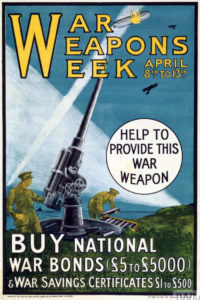 Of greater concern to most people than war loans were the continuing food shortages. The Grammar School had to suspend school dinners, although children were allowed to bring food from their homes to be warmed or cooked. To ease the situation, voluntary rationing was still being urged. The Reverend Burnham, vicar of South Ossett, used his pulpit to tell his congregation to make do with less food if they did not want to go without completely. Voluntary restraint was not, however, enough. The Ossett Food Control Committee started rationing butter, margarine and tea as well as sugar.
Of greater concern to most people than war loans were the continuing food shortages. The Grammar School had to suspend school dinners, although children were allowed to bring food from their homes to be warmed or cooked. To ease the situation, voluntary rationing was still being urged. The Reverend Burnham, vicar of South Ossett, used his pulpit to tell his congregation to make do with less food if they did not want to go without completely. Voluntary restraint was not, however, enough. The Ossett Food Control Committee started rationing butter, margarine and tea as well as sugar.
As meat supplies dwindled, there were long queues at butchers’ shops. At the monthly meeting of the Borough Council the Mayor, Alderman Wilson, urged those who could afford fowl or game to buy them and to leave beef to the workers. Councillor Peace warned unless food supplies were improved there would be strikes in the town. His warning of strikes was repeated at the Trades and Labour Council, one member saying “men can not work in the mill or at the coal face without substantial food”.
At the town’s churches the issues of war and peace were addressed. Speaking to the Green’s Congregational Church’s Brotherhood, Alderman Ben Turner of Batley argued the churches had failed as the same God was worshipped in both the Allied and Central Powers. There was no glory in war, but there was glory in peace. He did not believe this was the last of all wars, unless they obeyed the doctrine “thou shalt not covet”. At Holy Trinity the Reverend Burlingham said that although the war was spoken of as a war to end war, war could not be stopped by war. If the Allies smashed Germany, there was no guarantee that it would be the end of war as this could only be guaranteed through the adoption of the motto, “thy kingdom come, thy will be done.” At the Green Congregational Church J. Gomer Williams wished every blessing on the League of Nations, adding that it could not do without God.
Standing in front of the Town Hall a crowd of 2,000-3,000 saw Lance Corporal G. E. Hardcastle presented with the Military Medal he had won in 1916 by the Mayor, Alderman Wilson. A brass band provided music and the ceremony was given a military air by the presence of the Volunteers and the special police.
At the Military Service Tribunal a difficult question was raised: was a 34 year old tram inspector who had been born in the U.S.A. but who had lived in Britain since the age of five liable to be called up? Told the American consul in Leeds was willing recognise the inspector’s U.S. citizenship by granting him a passport, the Tribunal avoided the issue by deciding he was not to be called up until an efficient substitute capable of driving a tram was available.
The new war bonds campaign started with a poorly attended meeting at the Town Hall addressed by two M.P.s. – Sir William Middlebrook and Gerald A. France. The Mayor said the Council would set an example by investing £5,000, but this was not enough to inspire the townspeople as the campaign raised only £44,000 for war bonds. The “Ossett Observer” consoled itself by noting that sales of war savings certificates in the town were exceptionally good and ‘the patriotism of the local people’ was “beyond question”.
 Food supplies were still causing concern, particularly the amount of meat being allocated to the town’s butchers. Ignoring the fact many townspeople had bought meat in Dewsbury and Wakefield, Ossett’s official meat ration had been set at 50% of the pre-limitation supply. As these people now had to buy in Ossett, the town lost and Wakefield and Dewsbury gained.
Food supplies were still causing concern, particularly the amount of meat being allocated to the town’s butchers. Ignoring the fact many townspeople had bought meat in Dewsbury and Wakefield, Ossett’s official meat ration had been set at 50% of the pre-limitation supply. As these people now had to buy in Ossett, the town lost and Wakefield and Dewsbury gained.
The Borough Council secured more land for allotments with the intention of increasing the number of plots to over 100. To encourage gardeners the local Allotment Society organised a series of lectures in the Town Hall. The first “The Soil and its Cultivation”, was given by Mr J.J. Green of the horticultural staff of Leeds University and attracted an audience of 100. Unluckily the allotment holders faced a shortage of animal manure and of basic slag, the cheapest of the phosphate fertilisers.
During the Chamber of Commerce’s discussion of post-war housing, Mr J. H. Glover argued that the provision of housing should be left to private enterprise: “successful businessmen ought to tackle the problem, by making proper provision for their employees, and forgetting all about the financial return”. Mr Hyman disagreed. The housing shortage was so great, he said, it could not be met by private enterprise. The post-war world was also discussed at the annual meeting of the Conservative Club. Mr J. Ward, the President, was opposed to the country returning to free trade as it might lead to the country becoming dependent on cheap German imports. He was also against an immediate reconciliation with the Germans because of the way they had fought the war. He did, however, favour women having the vote. They, especially those who had lost sons or husbands, would never forgive the Germans and they were quite as fit as men to vote.
Among the 14 representatives of the General Union of Textile Workers who visited the British front in France during the month were two Ossett men. They came back with a strong impression “of the awfulness of war, of its indescribable immensity and of the vital need of peace coming only through Allied victory over the enemy”. Yet the prospect of victory probably seemed remote to the readers of the “Ossett Observer” as they read its headlines on March 23: “GERMAN OFFENSIVE BEGINS. BIGGEST ATTACK OF THE WAR. INFANTRY ASSAULTS ON A FIFTY MILE FRONT.” Under this attack the British Fifth Army virtually collapsed and within a week the Germans had advanced 40 miles.

Just as the German offensive was about to begin, Ossett experienced a Zeppelin alert which brought an operetta performance in the Town Hall to an abrupt end. The special police were called out to enforce the lighting restrictions and found that many people were ignoring them. Most householders, however, were willing to follow police instructions to dim or extinguish lights, although there were some cases of what the police called “obstructive” behaviour.
There was good news about food. Following complaints about the town’s meat supply, the Food Controller agreed to a 10% increase in the amount allotted to the town. However, when the rationing of tea was temporarily suspended in Ossett, there was panic buying by residents and non-residents alike with the result that supplies ran out. Not surprisingly tea rationing was re-introduced. It was not only tea that was in short supply. The “Ossett Observer” was reduced to four pages because of the paper shortage.
At the Allotment Society’s well attended first annual meeting, it was reported it had over 200 share holding members and arrangements had been made to supply them with necessaries such as seeds, lime and feeding stuffs for poultry. The Mayor, Alderman Wilson, was elected President of the Society.
Ossett’s housing needs continued to be discussed. In a letter to the “Observer”, “Honore and Labore” claimed some houses in the borough were so small there was “hardly the possibility of respectability, to say nothing of morality.” The Chairman of the Council’s Building Committee, S. B. Stead, was also concerned about the size of houses: in future, he said, the Council wanted every house to have three bedrooms, a bathroom and a garden. The question of financing house building was raised again at the Chamber of Commerce. It was claimed most people thought private finance would be insufficient to build the houses the country needed, but if public funds were used would the money come from general taxation or the rates?
The Trades and Labour Council was also looking to the future as it passed a resolution of the League of Nations. Supporters of the League hoped it would foster open rather than the secret diplomacy and Mr France blamed the latter for what he called “this damnable and bloody war.” Again looking to the future, the Council also passed a resolution in favour of women becoming solicitors.

Meanwhile Miss Burlingham, daughter of the vicar of Ossett, was tackling a more immediate problem – the war time increase in venereal disease. To aid her work as honorary secretary of the Ladies’ Committee for Combating Venereal Disease, the Borough Council allowed her free use of a room in the Town Hall to hold lectures on the subject.
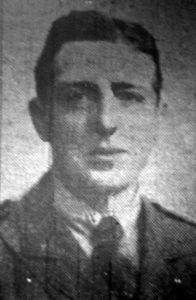 Gladys Jessop received news that her 24 years old husband, Lieutenant George Jessop (pictured far left), had been killed in France. They had been married while George was on leave in March. Another Ossett casualty was Private Sam Padgett, also killed in action in France. He had been awarded the Military Medal and the Belgian Croix de Guerre. The two men were among the more than 30,000 casualties the British army was suffering on average each week at this point in the war.
Gladys Jessop received news that her 24 years old husband, Lieutenant George Jessop (pictured far left), had been killed in France. They had been married while George was on leave in March. Another Ossett casualty was Private Sam Padgett, also killed in action in France. He had been awarded the Military Medal and the Belgian Croix de Guerre. The two men were among the more than 30,000 casualties the British army was suffering on average each week at this point in the war.
The need to replace men such as George and Sam had led to the passage of a new Military Service Act which raised the age of military service to 50. However, a proposal to extend conscription to the clergy was withdrawn prompting the vicar of Gawthorpe, the Reverend G. L. H. Harvey, to ask the Bishop of Wakefield for permission to volunteer for combatant service in the army. As he had already served for a year as a military chaplain on the Western Front, he knew what he was volunteering for. Another result of the manpower crisis was the large-scale withdrawal of exemptions from military service in the woollen trade, particularly in the shoddy and mungo industries.
The Mayor of Ossett, Alderman Wilson, appealed for funds to provide an auxiliary military hospital to which convalescent soldiers from Staincliffe Hospital in Dewsbury could be transferred. Among the places suggested as locations for the new hospital were Heath Hall and Heath Old Hall near Wakefield.
Food shortages continued to cause problems and during one week practically no bacon was available in the town. However, the introduction of a new rationing scheme meant that overall Ossett was entitled to a bigger supply of meat. To increase the supply of vegetables, the borough council’s allotment committee decided to offer prizes for the best plots. The committee was particularly keen to have more potatoes grown. It was estimated that a 300 yards allotment, given an average crop, would produce a year’s supply of potatoes for a family of five.
Local temperance workers involved in the “Strength of Britain” campaign began to prepare for a local plebiscite on the question “Are you in favour of the suspension of the liquor traffic for the period of the war and demobilisation?” Supporters of prohibition argued drinking reduced military and civilian efficiency and wasted valuable cereals.
In his article about housing for the “Ossett Observer”, Alderman Robinson pointed out there was plentiful building land in Ossett and luckily most of it was in the East Ward where the need for housing was greatest. He argued that if rents were set at the existing reasonable levels, the costs of the new housing would have to be subsidised out of public funds. Fortunately, the government had promised to contribute towards the cost of house building and this meant rents could be kept down. Robinson’s view was that building at least one hundred houses in Ossett would considerably ease pressure on the housing stock.
The Chamber of Commerce discussed the employment of demobilised soldiers. Mr B. P. Wilson wanted them to have their old jobs back with the government keeping them on full pay until they had been found work. He wanted, he said, no repetition of the disgraceful treatment of discharged soldiers which had followed the South African War. Another member of the Chamber, Mr H. Wade, wanted men who were unfit for the work they had done before the war to be provided with employment at the same wages.
As a result of February’s Representation of the People Act, Ossett’s Overseers of Poor prepared to draw up a new parliamentary electoral register for the borough including women among the voters for the first time.
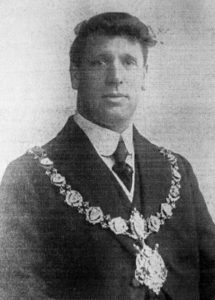 The Mayor, Alderman Wilson, (pictured left) resigned from the Ossett Military Service Tribunal. As the maximum age for military age had been raised to 50, the Mayor, who was in his 43rd year, felt he should not adjudicate on claims for exemption made by men who were older than himself. The Tribunal elected Councillor W. Moys as chairman in Wilson’s place.
The Mayor, Alderman Wilson, (pictured left) resigned from the Ossett Military Service Tribunal. As the maximum age for military age had been raised to 50, the Mayor, who was in his 43rd year, felt he should not adjudicate on claims for exemption made by men who were older than himself. The Tribunal elected Councillor W. Moys as chairman in Wilson’s place.
A procession organised by the National Association of Discharged Soldiers and Sailors attracted a large number of spectators. It was followed by a well attended meeting in the Town Hall which was intended to raise public awareness of the plight of former servicemen.
The town’s supply of coal was threatened by the withdrawal of more men from the mines for military service. One forecast was that output would fall by 15-25% and plans for coal rationing were drawn up.
Inspired by the success of communal kitchens in other towns, the Ossett Food Control Committee drew up plans for a kitchen in the Town Hall which would provide 100 take-away meals a day. Until arrangements for a supply of meat had been made, dishes were going to be vegetarian, although it was expected bones would be available for soup. Not all members of the Borough Council supported the scheme. Councillor Marsden believed it was unnecessary and Alderman T. W. Bentley thought the Town Hall was an unsuitable venue because its kitchen was too small. However, the mayor was more optimistic, saying he would like to give the scheme a trial.
During a debate in the House of Commons it was suggested that the new register of voters would be ‘uncommonly incomplete’ because of a lack of qualified staff to help people fill in the registration forms. In Ossett, an assistant overseer with a gift for organisation overcame the difficulties. After the forms were distributed, trained enumerators made a house-to-house canvas to help house holders complete them. As a result, the work of compiling the register was finished by the overseers in early May.
When the results of the Ossett plebiscite on prohibition were published, supporters of the temperance movement were no doubt pleased: there were 4,576 votes for prohibition and 979 against, a majority of 3,957. 688 blank papers were handed back by those who preferred not to vote. No doubt the result would have been different if the men absent in the services had been able to take part. Unfortunately for the temperance movement Parliament did not introduce prohibition.
The men who were at a well-attended meeting of the Ossett Roundwood branch of the Yorkshire Miners’ Association were also disappointed. They voted in favour of abolishing the Poor Law, a measure Parliament did not support
The firm of Bentley Brothers, which was headed by Alderman T. W. Bentley, suffered a severe blow when its mill in Teall Street, together with its stock of rags and mungo, was almost completely destroyed by fire. The cost of the damage amounted to £10,000 and neither the stock nor the buildings were insured.
The Reverend G.L.H. Harvey, vicar of St Mary’s, Gawthorpe, left his parish to go into training for combatant service in the army. Another Gawthorpe clergyman, the Reverend T. C. Evans, pastor of the Zion Congregational Church, also left Ossett for four months service at the front with the Y.M.C.A.
At the meetings of the Military Service Tribunal most of the cases were reviews of exemptions requested by the Ministry of National Service. The remainder of the cases concerned men of the new military age, among them the Mayor, Alderman Wilson. He claimed exemption on business grounds, telling the Tribunal he had sole responsibility for a firm employing over 90 people which had a turnover of more than £100,000. He said if he was called up he would have no choice but to shut up the business. The Tribunal granted him exemption for six months.
Another case before the Tribunal concerned an 18 years old conscientious objector. He was a Methodist and his appeal was based on his Christian beliefs, war being in his opinion contrary to the teachings of Christ. Victory in war, he said, did not prove which side was right, but only which side was stronger. His testimonials included one from the Reverend J. Phillips and another from the Reverend E. Lacey, chaplain to the forces. He refused to take non-combatant service or to have anything whatever to do with the military. The Tribunal decided to refuse exemption.
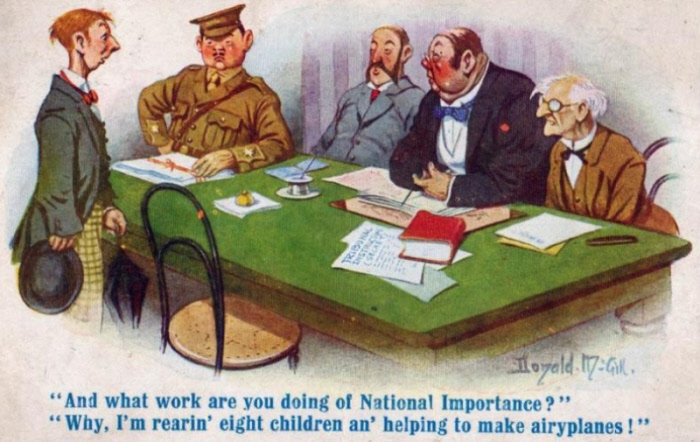
Two alleged army deserters, Arthur and Peter Senior of Flushdyke, were charged under the Larceny Act of being in possession at night of house breaking implements. They were committed for trial at the next Quarter Sessions.
Edmund Lund, the honorary secretary of Ossett War Savings Committee, was awarded the O.B.E. The “Ossett Observer”, claimed that the success of the savings movement in the borough was due more than anything else to his initiative, effort and undoubted gift of organisation.
A new scale of salaries for teachers in Ossett was adopted by the Borough Council. As it was uniform with that approved by a conference of West Riding education authorities, the town would no longer be a low salary employer. The wages of workmen and staff employed by the Council was also raised.
The shortage of agricultural labour prompted a squad of eight Ossett Grammar School boys to offer their services for agricultural work during the summer holidays and the harvest with preference being given to local farmers who wanted their assistance.
The “Ossett Observer” published a letter from Fred Terry, County Organiser of the Department of the Controller of Paper. He wrote that the country was close to a ‘Paper Famine’ and called for the collection of waste paper and paper making materials such as shirts and window curtains. The Borough Council responded to the situation by making arrangements for the collection of paper making materials in Ossett.
The town was also threatened by a water shortage. Too little rain over the Pennines meant the reservoirs which supplied Ossett were running low.
Mr W. France, a member of the Ossett Military Service Tribunal, walked out in protest from one of its meetings. The National Service representative had announced he would appeal against a six months exemption just granted to a local man and France believed the Appeal Tribunal was biased against the men appearing before it. Of five recent appeals by the National Service representative against the Ossett Tribunal’s decisions, four had been allowed and two appeals by men who had been refused exemption by the local Tribunal had been rejected. One man whose appeal was unsuccessful was a Primitive Methodist conscientious objector. Basing his objection on the New Testament, he said he was willing to do work of national service, but not if it released another man to fight. Although the Ossett Tribunal reported it did not believe a young man of 18 ‘could seriously’ hold the views he put forward, one member of the Appeal Tribunal, the trade unionist Ben Turner, was sympathetic towards him. Turner suggested he should be placed on work of national importance, but the Tribunal decided by a majority to dismiss the appeal.
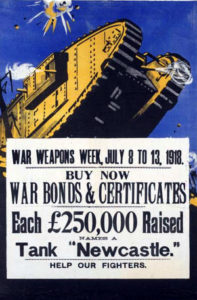 The words “Send the Huns a bomb from OSSETT” headed an advertisement for War Weapons Week in the “Ossett Observer”. Money raised from the sale National War Bonds and War Savings Certificates during the week was going to be used to buy guns and aeroplanes named after the town. The campaign raised £83,277 in bonds and certificates and was a “splendid success” according to the “Observer”.
The words “Send the Huns a bomb from OSSETT” headed an advertisement for War Weapons Week in the “Ossett Observer”. Money raised from the sale National War Bonds and War Savings Certificates during the week was going to be used to buy guns and aeroplanes named after the town. The campaign raised £83,277 in bonds and certificates and was a “splendid success” according to the “Observer”.
At the Chamber of Commerce’s meeting there was a discussion of the spread of Bolshevism in Britain. Mr J. Ward took the threat seriously as he thought too many people were becoming inclined to peace at any price. Although it was difficult to talk to such people in their present state of mind, the Chamber of Commerce should publicise the war aims of the Allies in order to restore morale.
The Mayor, Alderman Wilson, presided over a public meeting in the Market Place at which Alderman Robinson proposed a motion in favour of harsher measures against enemy aliens. He wanted to give the country’s “fighting heroes” a fair chance, but every German at large, naturalised or not, was a danger. Seconding the resolution, Alderman Bentley said powerful men had escaped internment and harmless ones had been interned. Mr B. P. Wilson proposed an amendment in support of the measures proposed by the government. Saying that mass internment was impractical and unjust, he condemned the cry of ‘intern them all’ as the senseless creation of the “Yellow Press”. When Mr W. Hyman seconded the amendment, a voice in the crowd called out “is he an alien?”. Hyman’s answer was that not only was he British born and had never been out of the country, but that his parents were British born as well. He was as proud to be an Englishman as he was to be a Jew. Alderman Robinson’s resolution was passed by an overwhelming majority, but many of those present did not vote.
The Ossett and Horbury Trades and Labour Council also discussed measures against enemy aliens. Councillor Lake of Horbury said it would be better for the country if people of enemy origin were removed from the Privy Council rather than interning a few pork butchers. Other members argued it was easier for an influential rich man to prove his loyalty than a worker and that the government’s scheme for dealing with enemy aliens was far more satisfactory than the alternative being proposed. Eventually, the Council decided not to support the campaign for harsher measures against aliens.
Not only did a measles epidemic strike Ossett, but the first cases of Spanish influenza were reported in the town. Absenteeism from work and schools rose and by the second week of the month 25% of children were away from school. The Council responded by closing the elementary schools for a month and several Sunday schools also agreed to close.
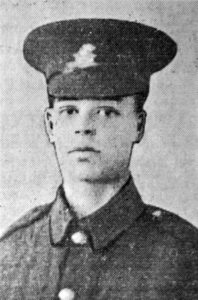 The fourth anniversary of Britain’s entry into the war was marked by special Sunday services in Ossett’s churches and chapels. Later in August a large crowd gathered in the Market Place to honour a local soldier when the Mayor, Alderman Wilson, presented the British Military Medal and the Belgian Croix de Guerre to the mother of Private Sam Padgett (pictured left) who had been killed in action.
The fourth anniversary of Britain’s entry into the war was marked by special Sunday services in Ossett’s churches and chapels. Later in August a large crowd gathered in the Market Place to honour a local soldier when the Mayor, Alderman Wilson, presented the British Military Medal and the Belgian Croix de Guerre to the mother of Private Sam Padgett (pictured left) who had been killed in action.
The “Ossett Observer” commented on the unfairness of making some men who were exempted from military service drill with the Volunteers. Men working in mines and munitions factories did not have to drill, but textile workers had to unless they could persuade a local tribunal they were doing additional work of national value. This was not always easy. The Ossett Tribunal had refused to exempt from drill a worker who was cultivating two allotments of his own and one for a man who had joined the army. Later in the month training with the Volunteers was made compulsory for all men exempted on occupational grounds. However, tribunals could dispense with the obligation if the applicants were doing alternative activities of value.
There were complaints about the quality Ossett’s meat supply and about a shortage of bread and yeast caused by a strike of yeast makers. As the rationing of coal, gas and electricity began in the town, its water supply was also restricted because of the prolonged dry weather. Water rationing affected the town’s mills first of all, but by the end of the month most houses had water for only short periods each day.
As the number of war time regulations multiplied, businesses found it increasingly easy to fall foul of the law. One of them was Low Laithes Colliery Co. which, with its manager, Alfred Blakeley, was fined for letting wagons without the permission of the Railway Licensing Department.
The Trades and Labour Council condemned the government’s closure of the printworks of the Socialist Labour Party. To one member the action was proof that ‘capitalism was falling to pieces and realised it.’ The Council’s discussion of the League of Nations, the international organisation the Allies proposed to create to preserve peace after the war, led to the expression of some pessimistic views. Mr C. Dews believed there would be wars as long as capitalism existed and they would only come to an end when workers became class conscious and realised it was in their interests to abolish war through an international league of workers. Walter Shires could not see wars being prevented in future because human nature was selfish and it would have to change before peace could be established.
Practically all of the town’s mines, mills and workshops closed for the August Bank Holiday. Many people went on crowded trains to resorts on the East and West coasts. At the end of the month the town’s colliers had another break when for a day they joined a strike of Yorkshire miners. Condemned by the “Ossett Observer” as “nothing less than a national disgrace”, the strike was over whether the meal hours of the surface men were included in their 54 hours working week. The men claimed that their meal hours were included. Under the terms of the settlement the men were to work 51 hours a week and be allowed 30 minutes daily for their meals.
‘Observanda’ wrote to the “Ossett Observer” to complain about the closure of the town’s Sunday schools because of the measles and flu epidemics. The writer argued that it was wrong to close them because they were already finding it difficult to keep up attendance.
Ossett’s War Bonds Committee was asked to arrange a campaign to revive the town’s flagging contribution to war loans. By the end of the month the Committee had organised a “Feed the Guns with War Bonds” drive which was to start in October. As an incentive, the town was promised that if it raised £5 a head it would be presented with a 15 inch shell, while £4 a head would be rewarded with a 12 inch shell and £3 a head with a 9.2 inch shell.
Attempts to increase local food production were endangered by the outbreak of potato wart disease on an Ossett allotment. As the disease was extremely virulent, the outbreak was notified to the Board of Agriculture. This bad news did not discourage the Town Council’s Allotment Committee from holding a competition for the borough’s allotment holders. Mr J. G. Wilson of Chevet was the judge and awarded Mr J. W. Gooodaire the prize for the best first year allotment and Mr J. Whitlam the prize for the best second year allotment. At Woburn House Trade and Labour Club, a vegetable and flower show for allotment holders and cottage gardeners was opened by the Mayor, Alderman G. F. Wilson, while the first of what was intended to be an annual show of vegetables took place at South Ossett Working Men’s Club.
The water crisis was eased early in the month by rain over the catchment area of the Pennine reservoirs supplying Ossett. Later in September abnormally heavy rain led to floods in the Calder valley which damaged several fields of corn in the borough.
At the Chamber of Commerce’s meeting Mr B. P. Wilson read a paper on the coal crisis. He proposed Ossett should depend on its own coal output which was more than enough to satisfy its needs. It was uneconomic, he argued, for Ossett to buy gas coal from Barnsley, while selling its own gas coal in London. During the discussion of Wilson’s paper Mr G. Lucas said miners were shirking at work because they did not want to earn more and have to pay income tax. The Chamber agreed to forward Wilson’s proposals for local purchase to the Board of Trade and to the Coal Controller.
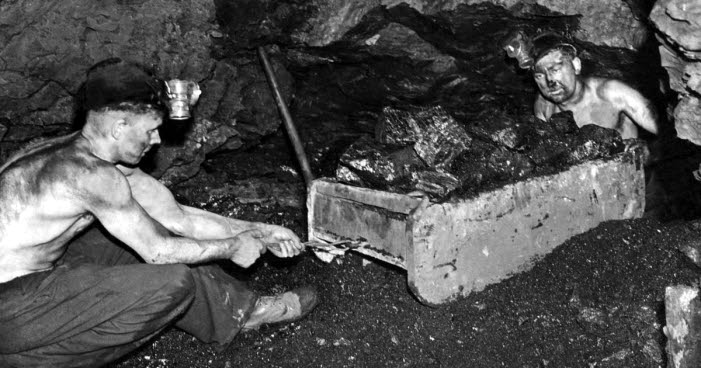
A Labour meeting was held at the Town Hall under the auspices of the Batley, Morley and Ossett Labour Party. Dr Marion Phillips gave an address dealing with social questions including housing. Urging women to study these questions, she said that the policies put forward by the Labour Party provided the right answers to them.
At Leeds Police Court Betty Brooks alias Betty France, aged 32, was charged with giving false information when registering at her lodgings in Woodhouse Square in Leeds. She was also charged with having obtained lady’s underclothes from Miss Stone of Great George Street and a lady’s dress from Madame Ernest of Commercial Street under false pretences. She had claimed to be the wife of an American medical man from New Jersey and said that her birthplace was Massachusetts. In fact, she was the daughter of a groom living in Ossett. Pleading guilty, she asked for similar offences committed in Birmingham and elsewhere to be taken into account. The court jailed her for four months.
Joseph Senior, a Flushdyke teamer, pleaded not guilty at Ossett Borough Court when he was charged under the Army Act with helping and concealing a deserter, his son Arthur. The magistrates found Joseph guilty and sentenced him to two months imprisonment without hard labour. In 1917 he had also hidden his sons Joseph and Edward when they had been on the run from the army.
Ossett’s ‘Feed the Guns’ campaign was postponed until January 1919. Over the previous year the town had bought £162,710 worth of war bonds, only 43% of its quota of £377,000. Wakefield and Dewsbury had done much better, both purchasing 64% of their quotas.
A lantern lecture was given in the Town Hall by David Hughes of Bradford. Entitled “In the Track of Allenby’s Army”, its subject was the British campaign against the Turks in Palestine and Syria. The lecture attracted a large audience and raised £18 6s 6d in aid of the Syria and Palestine Relief Fund. Another lantern lecture in the Town Hall was given by Mr T. E. Green of Horbury, a well-known speaker and photographer. His topic was “Scotland and the Scots” and the slide show raised money for the South Ossett Baptist Jubilee Fund.
The Mayor, Alderman G.F. Wilson, opened the National Kitchen in the Town Hall. This communal kitchen and dining room was so popular that the public hall had to be opened to customers as well as the Winter Garden. People were surprised by how good the food was, by the generous size of their portions and the low cost. A bowl of soup, a portion meat and potato pie and a serving of ginger pudding cost 8¼d. The popularity of the venture encouraged the Council to hire an extra cook and to make plans for new premises for the National Kitchen behind the Town Hall.
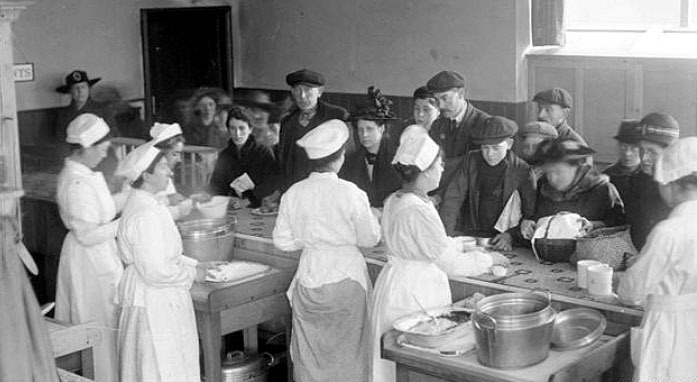
Above: Not Ossett, but a typical National Kitchen in 1918.
The Food Controller announced that the use of potato flour in bread was to be made compulsory in order to save wheat flour. An outbreak of black wart disease among potatoes on the Greatfield allotments was investigated by an inspector from the Board of Agriculture.
At the Chamber of Commerce’s monthly meeting, the President, Mr J. H. Gibson, spoke about the marvellous transformation of the military situation. This was due, he said, to the bravery and endurance of the British and Allied forces and the skill of their leaders. Gibson also praised the way the civilian population had, on the whole, borne restrictions and deprivations. A discussion of post-war British trade policy revealed differing views among the Chamber’s members. Mr G. H. Wilson said he still believed in free trade, while John Wilson admitted he had changed his mind on the matter because of the war. He feared that if the country pursued free trade it might lead to the dumping of products in the home market, low wages for British workers and a dependence on Germany for vital materials such as dyes. He also pointed out how the Germans had ruthlessly stripped northern France and Belgium of industrial plant during the war to gain ‘trade ascendancy’.
A committee was formed at Healey to create a roll of honour for local men who had served and fallen in war. The town’s War Memorial Committee met after an interval of a year during which it had gathered the opinions of men serving abroad as to what sort of memorial they wanted for Ossett’s fallen.
An 18 years old warehouseman, Roland Smith, appeared in the Borough Court following his failure to present himself for military service. Smith, a conscientious objector, had told the police he would not go until he was fetched. The Court fined him 40s and handed over to a military escort. Smith said he would not pay the fine. The issue of military service was also raised when shortly before the Armistice the Borough Council re-elected G.F. Wilson as Mayor. The only vote against Wilson was cast by Councillor D.H. Archer who said he could not vote for him because he was a man of military age.
The rapid spread of influenza in the town once more led to the Borough Council closing all schools. Sunday schools were also shut and children under 13 were banned from the Palladium cinema. Among the deaths from flu were three in one house at Roundwood.
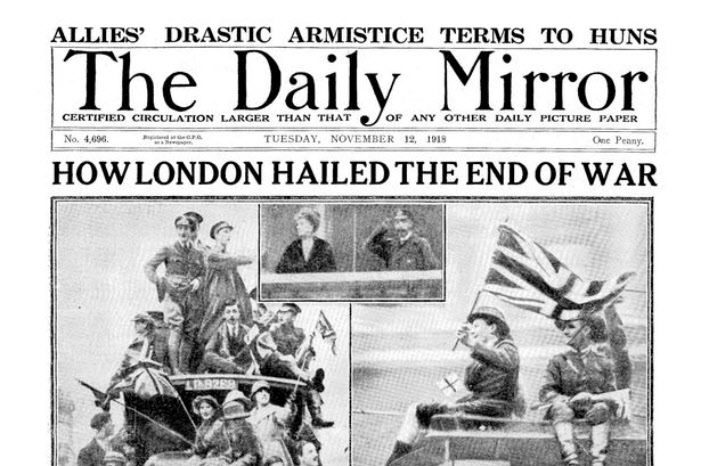
On Monday, 11th November rumours of an armistice were confirmed by a telephone call to the Town Clerk’s office about 11.30 a.m. As the news spread the Town Hall chimes and church bells rang, rockets were discharged from the fire station and mill buzzers sounded. Flags and bunting appeared on the Town Hall and many other buildings. At 2.30 p.m. the Mayor read the official telegram announcing the armistice to a large crowd in the Market Place. About 7.15 p.m. the Mayor lit a bonfire in Gedham Field. He also distributed fireworks he had bought to the town’s children. As the Ossett and Gawthorpe brass bands played, there was dancing in the Market Place. At several churches, including Holy Trinity, there were thanksgiving services during the evening. Later in the week, on Sunday night, there was multi-denominational service in the Town Hall attended by 2,000 people. During his address the Reverend Gomer Williams said that once and for all it had been shown that right and not might was the true measure of a nation’s strength, while the Reverend R.E. Burlingham spoke of looking forward to peace abroad and co-operation at home for the good of all.
Later in the month there was, in the words of the “Ossett Observer”, a ‘mild sensation’ in the town when a R.A.F. aircraft crashed in a field at the top of Wesley Street. The pilot, Lieutenant Taylor, had been taking the new plane from Doncaster to Newcastle when he lost his way in fog. While descending to find out where he was, he narrowly missed the spire of Holy Trinity before clipping a telegraph pole while landing. Fortunately, he was unhurt, but the plane was badly damaged and was taken away in pieces on a R.A.F. truck.
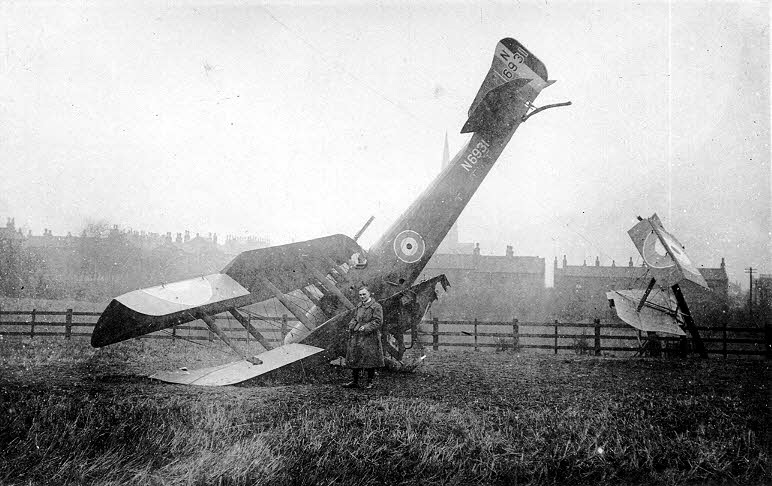
Above: The crashed aeroplane with Lieutenant Taylor.
The same week as the ‘mild sensation’ the War Memorial Committee held a public meeting in the Town Hall. Proposals for a memorial were discussed including a permanent roll of honour, recreation grounds for children, a fund to relieve war widows of rent and rates during widowhood and public baths. However, there were less than 20 people at the meeting, which a member of the Town Council said was an insult to the soldiers. Ossett had to wait until 1928 before there was sufficient public support in the town for a war memorial to be built.
Ossett Borough Council decided that land in Northfield Lane and at the junction of Teall and Spa Streets was suitable for the town’s first council houses. Councillor Peace wanted the new houses to have baths, hot water and good gardens. He also pointed out that the Northfield site was not the ‘pleasantest’ for the town’s soldiers to return to because it was close to the council’s refuse destructor.
By the end of the month a general election campaign was in full swing following the dissolution of Parliament. The recent redistribution of parliamentary seats placed Ossett in the Batley and Morley constituency and both the Coalition Liberal candidate for the seat, Gerald France, and the Labour candidate, Ben Turner, visited Ossett.